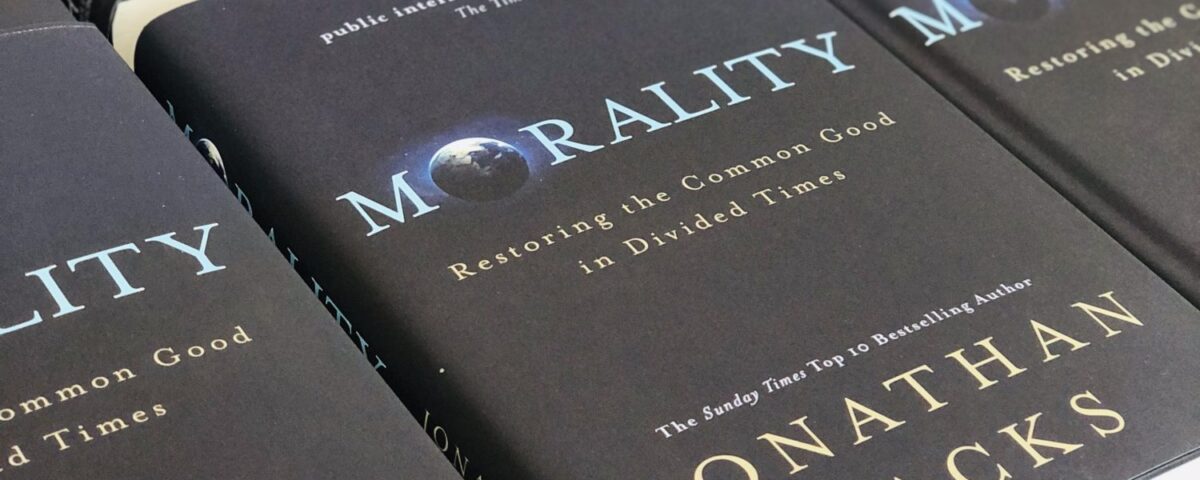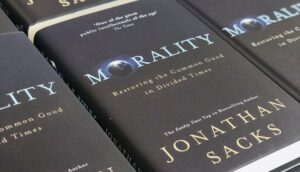REVIEW: Educating for “Morality”

Jonathan Sacks, Morality: Restoring the Common Good in Divided Times (Basic Books), 367 pp.
 In Morality, his final published book prior to his passing, Rabbi Jonathan Sacks discusses the numerous factors that have led to the transformation of human society from a “we” culture to one where “I” is the dominant theme. In progressive chapters, he claims that as a result: new levels of “loneliness” are being experienced; an emphasis upon “self-help” has replaced the value of helping others; the proliferation of social media has substituted “alone time” for in-person social relationships; there is a deemphasis upon the covenantal aspect of marriage in terms of sensing trust and faithfulness to another, and the promotion of contractual living together for as long as such an arrangement benefits the individual.
In Morality, his final published book prior to his passing, Rabbi Jonathan Sacks discusses the numerous factors that have led to the transformation of human society from a “we” culture to one where “I” is the dominant theme. In progressive chapters, he claims that as a result: new levels of “loneliness” are being experienced; an emphasis upon “self-help” has replaced the value of helping others; the proliferation of social media has substituted “alone time” for in-person social relationships; there is a deemphasis upon the covenantal aspect of marriage in terms of sensing trust and faithfulness to another, and the promotion of contractual living together for as long as such an arrangement benefits the individual.
R. Sacks traces the evolution of this ever-greater emphasis upon individuality via an impressive list of thinkers in fields such as philosophy, history, sociology, psychology, and more, alongside contemporary popular writing. As opposed to writing that is specifically focused upon traditional Jewish sources, such as his Covenant and Conversation series devoted to the Jewish Bible, and the Koren Prayer Book and Haggada for which he translated the Hebrew liturgy into English and provided commentary, Morality is a volume comparable to The Great Partnership, Future Tense, and To Heal a Fractured World. Those volumes, albeit reflecting an overall Jewish perspective, are primarily tracts that appeal to a more general audience, both Jewish and non-Jewish. The extent to which R. Sacks draws upon overtly Jewish sources appears to be a function of the intended audience of his writing. Part of R. Sacks’ genius was his ability to produce works that, on the one hand, are expected of a Rabbi preaching to his flock, and, on the other, acting as a public intellectual who numbered princes and prime ministers, and Christian clergy among those whom he was genuinely able to impress by the breadth of his thought, and commitment to universalism.
In Morality, R. Sacks attributes increased drug use and addiction, the trends to define morality and facts as subjective, and civilization’s apparent refusal to address global warming, as further indications of the trend to abandon concern for the “other” while emphasizing short-term gains of power and profit for the “self.” According to R. Sacks, who identifies his first intellectual and spiritual “love” as moral philosophy, “I-based” societies are moral rather than economic or political choices, and therefore to promote “other-based” societies is a profound moral act.
The conflict between self-indulgence and concern for one’s fellow man should be one of the major themes in all aspects of Jewish education, both from curricular and extra-curricular perspectives. Our educational enterprises, for children and adults, should self-consciously address these and comparable concerns. Students should be exposed in various formats to at least some of these issues, and, whenever possible, responses to these overall trends need be elicited from them. Positive development of attitudes regarding the world and each other ought to be a prime focus of education. These efforts should take the broad view, and not only be concerned with the lives and knowledge of the present-day learners, but also what sort of adults young students will hopefully become, and what types of homes, communities, and societies adult learners will contribute to forming.
The topics that once were central to Jewish education in order to familiarize students with the challenges they inevitably confront within general society, such as assimilation, intermarriage, life under various governmental structures, and aspects of Jewish identity, are now augmented by the issues raised in R. Sacks’ book. Assigning Morality as an age-appropriate course requirement, as well as following-up student reading with classroom discussions, essay questions, and film sessions of videos and movies, would go far in not only raising these issues, but also requiring young people to seriously grapple with them. (It is hoped that the Office of Rabbi Sacks, which continues his work, will undertake preparing educational resources on Morality alongside the fine work they have already begun. In the meantime, recordings of his BBC lectures which formed the basis of this book, are a good place to start.)
I find, at least anecdotally, that today’s day school students are either woefully unaware of current events, or are exposed only to single perspectives, often conforming to a narrow perspective reflected by that in their home, school, or community. (In fairness, in this regard they are no worse off than the majority of adult society and its echo-chambers.) While students regrettably may not start out interested in such matters, during the time they are students and “captive audiences” in our schools, it is fitting that such issues become part of their course of study. The encouragement of “critical thinking,” an educational value that most day schools at least pay lip service to, can only be achieved by exposing young people to multiple ideas and points of view, the likes of which may draw upon R. Sacks’ book. Sometimes aspects of such discussions may be contradictory to one another, particularly now that differing political positions have also informed this fundamental debate. Nevertheless, discussing students’ stances on issues, and encouraging their attempts to sort out for themselves their own future courses of action, and providing an impetus for activisim, is educationally desirable.
Examples of how Morality could prove useful to this endeavor include:
- The fact that social media has been identified as responsible for “FOMO” (fear of missing out, see p. 50) leading even to partial or full-blown Sabbath desecration and the so-called “Half-Shabbos,” should be formally presented as part of classes in day schools (see especially chapter 3, “Unsocial Media”).
- Those approaching marriageable age should not only be provided with rudimentary information regarding taharat ha-mishpaha (the laws of family life), but also the parameters of a proper marriage relationship, which could include R. Sacks’ chapter 4, “The Fragile Family.”
- Since the overwhelming majority of day school students will find themselves on the secular college campus, with its overbidding current aim to be an arena devoid of anything to which anyone may object, presentations on these topics while they are still within the “friendly confines” of Jewish schools, will help alert them to consider how to react when they are directly confronted by such situations in their future educational experiences (chapter 12, “Safe Spaces”).
- Furthermore, sessions regarding these important themes should be even combined with Tanakh and Talmud curricula. For some students, perceiving their Judaic studies teachers as concerned with both the standard curriculum of Jewish texts, as well as engaged with the constellation of topics, both eternal and contemporary, grouped under the title “morality,” would be beneficial to students’ respect for their instructors and teachings.
As a Jewish educator, I have long propounded the position that as long as a student has seriously thought about an issue in order to arrive at a defensible point of view, while I might not in the end agree with his or her conclusion, I would respect the student’s right to assume such a perspective. Yet I have found all too many teenagers, as well as adults for that matter, unthinkingly assuming particular perspectives without considering fully the ramifications of their views. Sometimes they come to realize at some later point how being more reflective “before the fact” could have saved them from making significant errors in judgment. R. Sacks’ book can serve as an important contribution to the production of morally sensitive, truly reflective individuals equipped with Jewish educations.
One unavoidable weakness in Morality, due to no fault of the author other than “timing,” is the absence of addressing head-on the changes that a post-COVID world will entail—for society in general and Jewish life in particular. In his brief Epilogue, written for the American edition of his book after the pandemic began to affect the world, but before his tragic passing last year, R. Sacks considers two traumatic events that took place during the 20th century: the Spanish Flu pandemic of 1918-20 and World War II. He describes how after the former, individualism continued unabated, and perhaps even to greater extremes than before, while the wake of the latter generated all sorts of “we” initiatives. R. Sacks labels himself an optimist, and therefore hopes that in the aftermath of COVID-19, there will be “a stronger sense of human solidarity,” a “keener sense of human vulnerability,” and a “strengthening of our sense of social responsibility.” He hopes for a reconsideration of “the morals of the market” and a retention of the “spirit of kindness and neighborliness” that at least some have demonstrated during this difficult time (see pp. 326-327). As observers of the effects of the pandemic upon themselves, their loved ones, their education, their communities, and their societies, day school students should be well-positioned to filter their impressions of life during the pandemic through the perspective of issues brought into focus by R. Sacks. Respectfully processing students’ ideas should add pertinence and long-lasting reverberations to their Jewish educations.
Rabbi Yaakov Bieler has worked in various capacities in day schools and synagogues in New York City and Silver Spring, and writes and speaks widely on aspects of Modern Orthodoxy. Many of his essays can be read at Rayanot Yaakov and on his personal blog.
